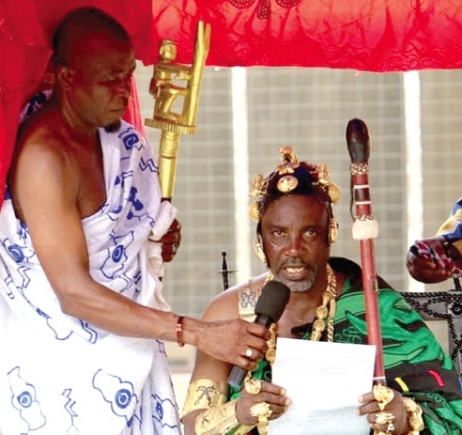An oversight visit to the Ayensuano District Assembly and Dokrochiwa has revealed that poverty and parental neglect remain major drivers of child labour and trafficking in the district.
The visit by selected Members of Parliament (MPs) and officials from UNICEF Ghana, the African Centre for Parliamentary Affairs (ACEPA), formed part of a programme to strengthen Parliament’s capacity to address children’s issues and assess the implementation of child protection initiatives.
Cause
Briefing the delegation, the District Chief Executive (DCE) for Ayensuano, Joshua Yaw Lartey, explained that the district, with an estimated population of about 100,000, is largely agrarian, with most residents engaged in cocoa, maize, and vegetable farming.
However, rural poverty, youth unemployment, and inadequate infrastructure continue to threaten social protection and child welfare.
“We cannot end child labour and trafficking if families are trapped in poverty and children lack access to basic education and opportunities,” he said.
Presenting findings from the field last Thursday, the Head of the Department of Social Welfare and Community Development (SWCD), Francis Adjartey, revealed that of the 35,402 school-age children between 5 and 19 years in the district, only 25,294 were enrolled in school.
“That means over 10,000 children are missing from classrooms,” he said.
Mr Adjartey explained that many of these children were found in markets pushing wheelbarrows, loading trucks, sewing sacks, or accompanying parents to trading sites during school hours.
“These children are being denied their right to education, and some causes included parental neglect and lack of supervision.
To address these issues, the district has formed and trained 33 Community Child Protection Committees across different communities to monitor and follow up on child welfare cases. These committees work with schools, families, and traditional authorities to identify children out of school and ensure their reintegration.
Intervention
The DCE said the assembly had created a Department of Social Welfare and Community Development (SWCD) to promote inclusive growth and ensure no child is left behind.
He added that the assembly, with support from UNICEF, had been implementing the Integrated Social Services (ISS) initiative since 2022 to coordinate child protection, health, and education efforts.
Through this programme, he said, 130 schoolchildren have received support under the Disability Fund Management Committee.
Despite these interventions, Mr Adjartey admitted that challenges persist due to limited resources and manpower and appealed for more support to sustain the intervention.
Sustainable investment
The Chief of Child Protection at UNICEF Ghana, Lucia Soleti, commended the assembly for its commitment and stressed the importance of inter-agency coordination.
She said the ISS approach, which has been rolled out in 210 districts across the country, focuses on helping different government agencies, including labour, education, social welfare, and security, to collaborate to prevent and respond to child protection issues.
Chief of Social Policy and Inclusion at UNICEF Ghana, Paulina Sarvilahti, urged Parliament and partners to ensure sustainable investment in child protection and social welfare at the local level to safeguard children’s futures.
For his part, Senior Governance Advisor at ACEPA, Issifu Lampo, said the oversight visit provided valuable insights into how MPs can use evidence from the field to shape national policy.
He explained that strengthening parliamentary oversight would help ensure that government programmes addressing child protection, trafficking, and education are well-resourced and effective.
“Our role is to provide Parliament with the evidence needed to guide national reforms,” he said.
“This requires capacity building, better resource allocation, recruitment of more social workers, and livelihood programmes for families so that poverty does not become an excuse for child labour.”
At courtesy calls to the Chiefs of Dokorochiwa Dawu, Barima Ogyeahihi Anom and Chief of Dokrochiwa Larteh, Barima Opoku Agyemang, both leaders commended the MPs and partners for their attention to local concerns, but appealed for sustained investment in social infrastructure and livelihood programmes to reduce poverty-driven child labour.
Pledge
The MPs, led by the Chairman of the Committee on Human Rights, Ernest Yaw Anim, and Chair of the Employment, Labour Relations and Pensions Committee, Joseph Appiah Boateng, assured the community that Parliament would work with key partners and relevant agencies to find sustainable solutions to the challenges identified, including strengthening child protection systems, improving resource allocation, and addressing the root causes of child labour and trafficking in the district.

